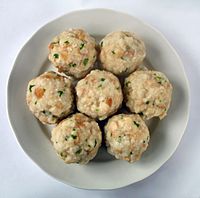Semmelknödel facts for kids

Semmelknödel
|
|
| Type | Dumpling |
|---|---|
| Place of origin | Austria Germany Czech Republic Italy Slovenia Croatia |
| Region or state | Central Europe |
| Main ingredients | bread, milk, eggs, parsley |
Semmelknödel are a type of dumpling made from bread. They are a popular dish in countries like Germany, Austria, and the Czech Republic. You can also find them in northern Italy.
The word "Semmelknödel" comes from southern Germany. Semmel means "bread rolls," and Knödel means something that has been "kneaded" or shaped. So, it literally means "bread roll dumplings"!
What are Semmelknödel?
Semmelknödel are soft, round dumplings. They are made from old, dried-out wheat bread rolls. Other key ingredients include milk and eggs. They are often served as a side dish with meat or gravy. Sometimes, they are even eaten as a main meal.
These tasty dumplings are a special food in many parts of Central Europe. People enjoy them in southern Germany, Austria, and the Czech Republic. In northern Italy, they have different names. For example, they are called "Canederli" in Trentino. In South Tyrol, they are still called "Semmelknödel."
How are Semmelknödel made?
Making Semmelknödel starts with stale white bread. This bread is cut into small slices or cubes. Then, it is softened with warm milk. This makes the bread soft and ready to mix.
Next, the softened bread is mixed with other ingredients. These include fresh parsley, an egg, and a little salt. Sometimes, bread crumbs are added. This helps to make the dough thicker. The amount of bread crumbs depends on how dry the old bread rolls were.
Some recipes also add other ingredients. For example, onions are sometimes included. The exact recipe can change depending on where they are being made. Each region might have its own special way to prepare them!
See also
 In Spanish: Semmelknödel para niños
In Spanish: Semmelknödel para niños
 | Bessie Coleman |
 | Spann Watson |
 | Jill E. Brown |
 | Sherman W. White |

